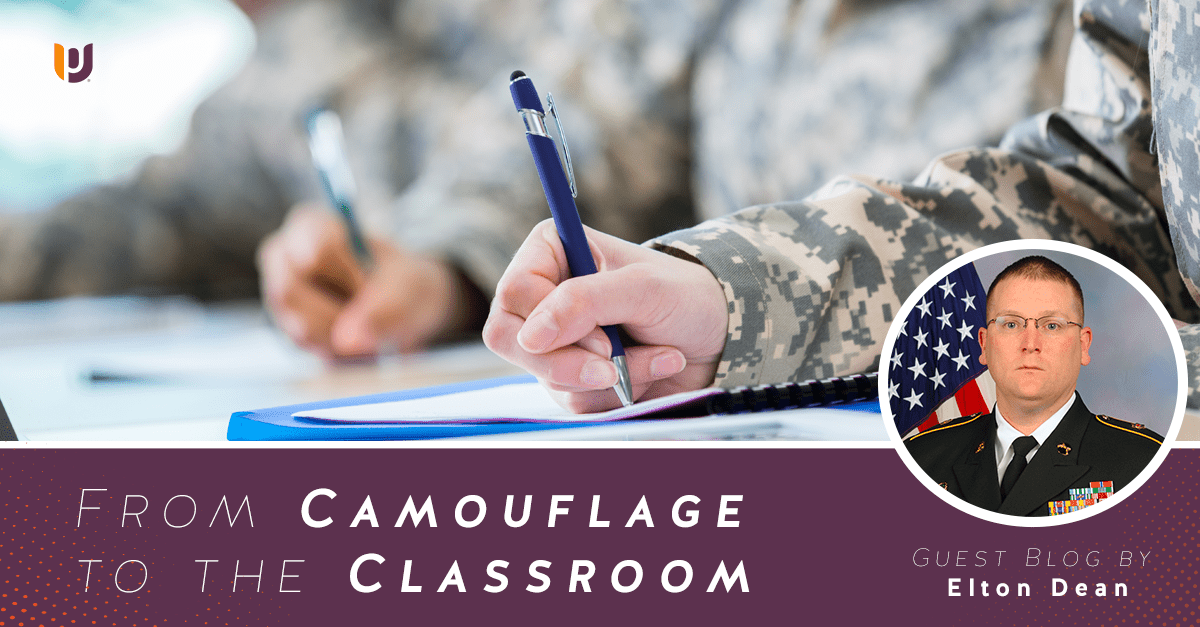By: Elton Dean
Teaching is a natural career progression for service members and military veterans. I retired from military service in 2016 and recently accepted a position teaching continuing education classes at a local community college. As I attempt to transcend from student to faculty at Post University, I recently realized that the path that seemed so disjointed in my head actually looks quite linear on paper. Many veterans are looking for a way to break into the teaching profession. If you are one of them, there are five principles that will help you on your journey; have a passion for helping others succeed, make a commitment to excellence, use your benefits, manage your networks, and translate your experience.
Teaching in an academic setting has not been a longstanding career goal of mine. I thoroughly enjoyed my military career and was not overly certain of what I wanted to do when I left. In the years following retirement, there was so much that I missed about my time in uniform. I reflected back on the specific things that had the most meaning to me and thought about what I could replicate in civilian life. I always enjoyed teaching Soldiers how to do things and I consistently sought out opportunities to instruct, but there is more to it than that. I loved seeing my Soldiers succeed. Teaching is about more than transferring knowledge, it is about helping others create opportunities to be successful.
The opportunities that I created for myself stem from an inability to be content with mediocrity. If I am going to do something, I am going to put everything I have into it. My college tenure began in 2012 as a response to a government shutdown and a furlough that reduced my income. The Post 9/11 GI Bill was a strong enabler for me because I essentially got paid to go to school. I was not an overly successful student in my younger years because I struggled to connect and engage with the material. I was nervous about taking college courses, but my goal was simply to do my best. I found a lot of success as an adult learner because my personal and professional experiences established a strong foundation for new learning to be built upon. As I continued to do well in each course, my academic goals continued to increase. I completed my Bachelor of Science in Management at Post University with a 4.0.
I never intended on going back for a master’s degree, but eligibility for vocational rehabilitation through the Department of Veterans Affairs offered another set of benefits so I was back at Post University for another round. My goals started high this time and they stayed there. I completed my MBA with a 4.0. I was unquestionably committed to excellence and it was worth the hard work. A couple of years later, Congress passed legislation that reinstated a year of Post 9/11 GI Bill benefits. Coincidentally, this aligned perfectly with my recognition of wanting to break into the teaching profession. I am back at Post University now working on a Graduate Certificate in Online Teaching. The job offer for my current teaching position was heavily based upon my academic record. None of this would have been possible if I just let my benefits sit there.
Credentials are certainly important, but networking is a critical supplementation. One of my professors offered his mentorship in networking back in 2014 and I took him up on it. One of the methods he emphasized was to get established on LinkedIn so I started my account and he was my first connection. Fast forward seven years, I messaged him on LinkedIn in hopes of receiving guidance on expanding my teaching experience at Post University. He responded almost immediately and his advice put me in touch with a military connection from over twenty years back. You never know who, how, or when someone will come back into your life so your ability to manage positive relationships within your network is essential.
Something that cannot be emphasized enough for veterans is to figure out how to translate your experience into meaningful terminology. A lot of veterans have a wealth of teaching experience that is perfectly relevant to the civilian world, you just have to help everyone see it. For many of us, our careers revolved around teaching. Think about all the train-the-trainer courses and the annual mandatory briefings. Look at all the hip pocket training you had to come up with. Unfortunately, the term hip pocket training does not translate well; however, saying delivered impromptu instruction oriented toward targeted learning outcomes translates perfectly. Tell people what they need to know in the way they need to know it. After all, that is what the art of teaching is all about.
Elton Dean has been a part of the Post University family for almost ten years. He completed his B.S. Management / Human Resources in 2014 and MBA / Leadership in 2019. He is currently working on a Graduate Certificate in Online Teaching. Elton reached the rank of Staff Sergeant / E-6 and received a medical retirement from the Massachusetts Army National Guard in 2016. He served for over seventeen years with more than fifteen years of full-time support in various capacities, including two deployments to Iraq and twelve emergency response activations. Elton is currently a Corporate and Community Education Instructor at Carteret Community College where he focuses on computer-based training for adult learners.
